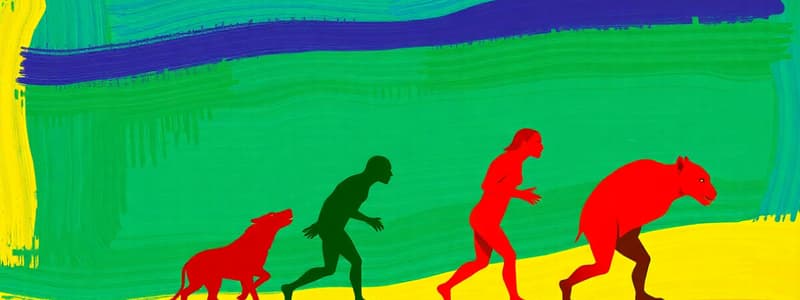Podcast
Questions and Answers
Lamarck's theory suggests that if a species stops using a certain organ, it will strengthen over time.
Lamarck's theory suggests that if a species stops using a certain organ, it will strengthen over time.
False (B)
According to Lamarck, acquired traits, such as increased muscle mass from exercise, can be passed down to offspring.
According to Lamarck, acquired traits, such as increased muscle mass from exercise, can be passed down to offspring.
True (A)
Lamarck proposed that all organisms spontaneously generate from non-living matter.
Lamarck proposed that all organisms spontaneously generate from non-living matter.
False (B)
Lamarck believed species change in response to their environment.
Lamarck believed species change in response to their environment.
Lamarck's work was immediately and universally accepted by the scientific community during his lifetime.
Lamarck's work was immediately and universally accepted by the scientific community during his lifetime.
The 'tendency towards perfection' in Lamarck's theory implies that organisms are constantly striving to become more complex and advanced.
The 'tendency towards perfection' in Lamarck's theory implies that organisms are constantly striving to become more complex and advanced.
Lamarck's theory correctly identified DNA as the mechanism for inheritance.
Lamarck's theory correctly identified DNA as the mechanism for inheritance.
Lamarck argued that the length of a giraffe’s neck is due to generations of giraffes stretching to reach high leaves, and this acquired trait is passed on.
Lamarck argued that the length of a giraffe’s neck is due to generations of giraffes stretching to reach high leaves, and this acquired trait is passed on.
According to Lamarck, if a crab loses a claw, its offspring will always be born without that claw.
According to Lamarck, if a crab loses a claw, its offspring will always be born without that claw.
The modern understanding of genetics supports Lamarck's idea of the inheritance of acquired characteristics.
The modern understanding of genetics supports Lamarck's idea of the inheritance of acquired characteristics.
Lamarck was born in Spain.
Lamarck was born in Spain.
Before his work on evolution, Lamarck was primarily known as a mathematician.
Before his work on evolution, Lamarck was primarily known as a mathematician.
Lamarck's evolutionary ideas were later supported and expanded upon by Gregor Mendel's work on genetics.
Lamarck's evolutionary ideas were later supported and expanded upon by Gregor Mendel's work on genetics.
Lamarck was the first scientist to propose any theory of evolution.
Lamarck was the first scientist to propose any theory of evolution.
Lamarck believed that species never change over time, maintaining a constant form.
Lamarck believed that species never change over time, maintaining a constant form.
Flashcards
¿Quién fue Lamarck?
¿Quién fue Lamarck?
Jean-Baptiste Lamarck was a French naturalist known for his work on the theory of biological evolution.
Ley de uso y desuso
Ley de uso y desuso
The principle that organs develop or atrophy based on their use.
Herencia de los caracteres adquiridos
Herencia de los caracteres adquiridos
Acquired characteristics during an organism's life can be inherited by its offspring.
Tendencia al perfeccionamiento
Tendencia al perfeccionamiento
Signup and view all the flashcards
La jirafa
La jirafa
Signup and view all the flashcards
El cangrejo
El cangrejo
Signup and view all the flashcards
Aportaciones de Lamarck
Aportaciones de Lamarck
Signup and view all the flashcards
Organismos cambian con el tiempo
Organismos cambian con el tiempo
Signup and view all the flashcards
Darwin's Foundation
Darwin's Foundation
Signup and view all the flashcards
Study Notes
Jean-Baptiste Lamarck's Theory
- Jean-Baptiste Lamarck's theory of evolution is presented.
- Aguilar Jaimes Yarely and Villa Maldonado Briceida are credited.
About Lamarck
- Jean-Baptiste Lamarck born August 1, 1744 in France, was a naturalist.
- He was known for his work on the theory of biological evolution.
- He became one of the first members of the French Academy of Sciences.
- Throughout his life, he worked as a botanist and zoologist, conducting research on animals and plants.
Main Postulates of the Theory
- The theory includes:
- The law of use and disuse.
- The inheritance of acquired characteristics.
- The tendency towards perfection.
Law of Use and Disuse
- The organs of an organism develop or atrophy depending on their use.
Inheritance of Acquired Characteristics
- Characteristics acquired during the life of an organism can be inherited by its offspring.
Tendency Towards Perfection
- Species have a natural drive towards complexity and perfection.
Classic Examples of the Theory
- The giraffe and the crab serve as classic examples.
Giraffe Example
- Giraffes have long necks because their ancestors stretched their necks to reach high leaves, resulting in an elongation that was inherited.
Crab Example
- If a crab loses a claw through disuse, its descendants would be born with smaller claws or without them.
Criticisms and Limitations
- The inheritance of acquired characteristics was disproved with the advancement of genetics.
Contributions of Lamarck
- Lamarck was the first to propose a theory about evolution.
- He introduced the idea that organisms change over time.
- His work laid the groundwork for other scientists, like Darwin, to develop more precise theories.
Review Questions
- Can the changes an organism undergoes during its life be inherited?
- What does the theory of use and disuse state?
- What are the three main postulates of the theory?
Studying That Suits You
Use AI to generate personalized quizzes and flashcards to suit your learning preferences.




